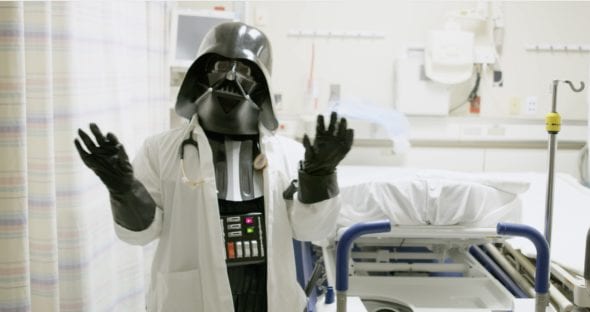What do you want us to do if your heart stops beating?
What are your end of life wishes? Have you even thought about it? Do your loved ones know what you want? What if something happened today, are your ready for the consequences of not making your wishes known? Are you ready for the impact it will have on those who survive you?
Do you really know what happens when you ask us to “do everything?”
Imagine a cold, sterile environment. Your heart has stopped and you are on a hard gurney surrounded by chaos. It is determined you have no pulse, and CPR is started. You manage to survive broken ribs, a breathing tube down your throat, line and shocks and wires and being stripped naked in front of strangers in a cold room. You’re then wheeled up to an ICU bed where you spend countless hours or days in a medically-induced coma. If you awaken, you’re unable to breathe on your own, unable to speak, often unable to move.
You think, “This is not what I wanted.” But it’s too late.
Will I survive?
Weeks later, if you are one of the 24% who even survive a code, you make it out of the ICU (this number assumes you don’t already have a chronic illness or other life-limiting condition). You have PTSD and/or post-ICU psychosis. Did you know that 1/3 of patients discharged from the ICU have cognitive impairment similar to a traumatic brain injury or Alzheimer’s Disease? Others face possible PTSD and depression. You have healing rib fractures. You may be dependent on multiple medications. Are you on dialysis too? Would it still have been worth it?
How can I prevent this if this is something I don’t want?
This scenario is entirely preventable by YOU. Tell someone you care about what your values and wishes are. Here’s a great way to break the ice. It doesn’t matter how old you are. Have the conversation NOW.
Maybe you are young and you want everything up until the doctors say they have tried everything. Maybe you are older, have a terminal diagnosis, etc: do you really want to die like this? 20% die in this cold, sterile, painful setting, forced by protocol into torture followed by inevitable death. It always seems too soon until it’s too late…talk about it now.
Who can I ask to carry out my wishes?
Pick someone who will be able to carry out your wishes under stress without letting their emotions interfere with carrying our your wishes. Use resources to guide you in finding the right person, talking about your wishes to someone who may not agree with you, and talking with your healthcare team.
ZPac, talk with your loved ones today. Watch the original video on Facebook and share this with your friends, family, neighbors, and coworkers. No one is too young to talk about this today. Leave your comments, I’d love to hear your thoughts and experiences because they can inform and guide others!
AMA 02: What "Do Everything" Really Means
The unspoken truth I want my patients to know about so-called "heroic" measures at the end-of-life. Please talk with those you love about your wishes. It always seems too soon…until it's too late.
Posted by ZDoggMD on Wednesday, June 20, 2018
Okay, those of us who work in healthcare have seen some horrible scarring things in our careers, and it’s weird because we’re actually still afraid to talk about these things with our patients to prevent them from happening in the future. So I am gonna walk you through one of these scenarios that terrifies doctors and nurses and people who take care of you and should terrify you into actually doing something to prevent it. Imagine this. You have not talked about what your wishes are at the end of life. You’ve never had the conversation because you think you’re gonna live forever, and something happens. You’re found unconscious, the paramedics rush you to the hospital, and this happens. You lose your pulse. You stop breathing. You’re in the emergency department. What happens next? The nurse who notices this calls what we call a code or a rapid response, and all hell breaks loose. Every single person you can imagine in the hospital shows up at that bedside: medical students, nursing students, nurses, doctors, anesthesiologists, pharmacists, everybody, and this is how it goes down. Someone checks for a pulse, and they realize you don’t have one. They put pads on you to try to see what your rhythm is, and they see you don’t have a rhythm. The next thing they do is they grab a student and they put them at your sternum and say, “Begin compressions.” And it looks like this. They are on your sternum pushing hard on your chest. Presumably you’re unconscious, but if they push hard enough you just might get enough circulation to be peripherally aware of the rest of the torture that’s about to happen. At this point one of the attending physicians sees that this guy’s pushing on your chest and says, “You’re not doing it right. “You need to push harder and faster.” Two to three inches and you start to hear the ribs crack. At this point someone’s at your head pushing your head back into a jaw-thrust position and taking something called a laryngoscope because you’re not breathing. They need to do something ASAP. They don’t have time to worry about whether this metal crowbar that they’re using to pry open your airway is gonna crack your teeth or cause any damage to your soft tissues. They are gonna pry it open to take a look at your vocal cords, and then they are gonna pass in a tube about this big into your airway and start bagging you. They might miss first. They might go into your esophagus, in which case your stomach will hyperinflate and get distended until they figure it out, pull out, and put it back in. At this point there’s yelling and there’s shouting, and they start to figure out we need to get IV access so we can give you drugs to get your heart started and get your blood pressure back up. Well, where are the easiest places to go? If we can’t get an arm because you’re dehydrated or you’re in shock, we’re gonna go in the groin. And at this point an intern or a resident is gonna start poking around with a needle about this big in your groin. Blood will be going everywhere. They might hit your artery in their rush to find the vein, in which case you’ll get a big bunch of blood under the skin there. They’ll then fish in a wire into your vein and put in a catheter and stitch it into your groin. At this point they’re squeezing you full of medication, some of which your body makes naturally under stress like epinephrine, which if you were aware of what a super therapeutic dose of epinephrine felt like, it would feel like an elephant was standing on your chest and you were about to die. At this point the cracking ribs is still going on, they’re squeezing air into your chest, and they’ve hopefully given you something to sedate or paralyze you, but that’s not always guaranteed. And if you’re even peripherally aware because of the little bit of circulation you’re getting, it is gonna feel… We talk about waterboarding in this country. Oh, that is child’s play compared to the torture that you are undergoing right now. But here’s the kicker. If you survived this so far, and by the way, that’s not guaranteed, you may die right then under torture, you may wake up in a clinical setting with beeping machines and a person staring at you that you’ve never seen, unable to speak, unable to move, but aware enough that you can notice the horrible situation that you are now in. There may be a tube in your rectum to take care of the number two. A ventilator may be breathing for you, so you have no control and you feel that hunger for air but you have no control of your own breathing. All of these things you might wake up to and worse. Tubes, wires, chaos. And it’s no wonder that even people who survive the ICU often have post-ICU psychosis and PTSD from their experience there. Now in the setting of all this you might still die in that setting, and all of this is entirely preventable by you. All you had to do was tell someone you cared about that you determined is gonna make decisions for you when you can’t what your values and wishes are. If you’re a 38-year-old guy and you think that the CPR might get you healthy again, you may tell them do everything until it looks like the doctors are saying it’s not gonna work anymore. In which case I want you to stop, make me comfortable, give me medicine to keep me comfortable, maybe take the breathing tube out, give me full-flow oxygen, and let me pass. Allow natural death, A-N-D. But what if you’re 80 or 85 and you have dementia? What if you have cancer that’s terminal? What if you have another terminal condition? Would you even want to go down this route and die like 20% of Americans do in a critical care bed surrounded by strangers in the coldest place you can be in? That is entirely preventable, and this is what infuriates me as a hospital is seeing this ball dropped time and time again and being forced by protocol and by law to torture people until they die. You can stop this. It always seems like it’s too soon until it’s too late. Pick someone to make decisions for you that won’t be blinded by emotion when the time comes, and then tell them what your values and your wishes are around resuscitation, around heroic efforts, around how long you want them to try. And if they understand what your values are they can parse them in real time when the time comes. And let them know you love and appreciate them for taking on this burden. Do it today before it’s too late.
Category
- The ZDoggMD Show (818)
- Featured Videos (189)
- Doc Vader (142)
- Against Medical Advice (128)
- Medical Humor (95)
- Public Service Announcements (87)
- Music Parodies (74)
- Nurses (59)
- Meditation (46)
- The VPZD Show (38)
- ZVlogg (36)
- ZTalks (28)
- ZBlogg (24)








